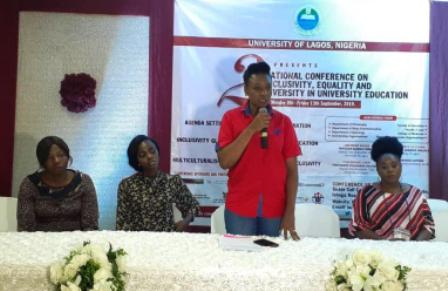Society for Family Health counsels Nigeria on how to achieve SDGs
Says government should give adolescent girls access to health
Nigeria will move closer to achieving major targets of the Sustainable Development Goals (SDGs) by assuring adolescent girls access to health and critical social services, the Society for Family Health has said.
The action will also promote social inclusiveness and help drive down maternal mortality, some drivers of which are unplanned pregnancies and unsafe abortion among adolescent girls and young women, said Pharm. Fifi Ogbondeminu, Deputy Project Director of Adolescents 360 (A360), a project implemented by SFH. She said this at the National Conference on Inclusivity, Equality & Diversity in University Education hosted by the University of Lagos.
According to Ogbondeminu, SFH started A360 in June 2017 to break down barriers to some critical social and health services for adolescent girls aged 15 – 19 years by creating safe spaces in public health facilities where they can achieve their dreams by acquiring life skills, vocational skills, and making informed choices to create the future they want. A360 co-designed the 9ja Girls programme in southern Nigeria, and Matasa Matan Arewa (MMA) in the north with adolescent girls and their influencers. The programme is funded by the Children Investment Fund Foundation (CIFF) and the Bill and Melinda Gates Foundation (BMGF).
A good starting point is the review and implementation of the National Policy on Integrating Youth-Friendly Services into Existing Primary Health Care Centres, said Ogbondeminu.
“While testing prototypes when A360 started, we considered the use of the existing youth friendly centres and PHCs to determine which was better for integrating youth-friendly services into the system. We found out that girls were willing to access services in PHCs as long as the providers were youth-friendly,” she added, urging the federal and state governments to upscale safe spaces for adolescent girls to more primary health care facilities.
A360 Nigeria built on the availability of health providers who were volunteering through government programmes such as the SURE-P and the N-power programmes, trained and built capacity of these volunteer service providers. The government could adopt replicable components of A360 programmes and absorb the trained volunteers, which will ensure trained and skilled youth-friendly providers remain in the system and girls continue to have access to adolescent sexual and reproductive health (ASRH) services even after A360 project closes out in 2020.
“States should also train service providers to be youth-friendly and provide Adolescent Sexual Reproductive Health, thereby increasing the network of youth-friendly service providers, which will in turn increase access,” said Adebusola Odulaja, Regional Coordinator of the A360 Project. One of the challenges of the progamme is that girls complain of long distances to facilities, she said, adding, “Adolescents are usually deprived of access to services. We see cases of facility security personnel turning girls back, thereby denying them access,” Odulaja explained.
With a maternal mortality ratio at 546 deaths per 100,000 live births (amounting to 40,000 pregnancy-related deaths annually), Nigeria accounts for 14 per cent of the global burden of maternal deaths, 95 per cent of which are caused by seven preventable conditions, including unsafe abortion.
Each year, it is estimated that between 610,000 and 1.2 million abortions are procured by women aged 15-44 years. Experts say that if all females who need family planning had access, 44 per cent of all maternal deaths in Nigeria will be averted.
By ensuring inclusiveness for adolescents, SDG Goal 3 (Ensure healthy lives and promote well-being for all at all ages); and Goal 5 (Achieve gender equality and empower all women and girls) will be automatically addressed.
Major SDG targets that may be impacted are those relating to:
- Reduction of maternal mortality ratio to less than 70 per 100,000 live births;
- Ending the epidemic of AIDS and other sexually transmissible infections;
- Ensuring universal access to sexual and reproductive health-care services, including for family planning, information and education, and the integration of reproductive health into national strategies and programmes;
- Ending all forms of discrimination against all women and girls everywhere; and
- Ensuring universal access to sexual and reproductive health and reproductive rights as agreed in accordance with the Programme of Action of the International Conference on Population and Development and the Beijing Platform for Action and the outcome documents of their review conferences.
n the safe spaces created for them, girls have access to trained counsellors, who give information and discuss with them sexual and reproductive health issues, as well as other life skills, while the sexually-active can voluntarily access modern contraceptives. A major goal is to equip girls to delay the start of sexual activity, have healthy relationships, empower them to say no to sex, as well as to be able to negotiate when under pressure.
In the two Lagos local government areas (LGAs) where “9ja Girls” is implemented, almost 23,000 girls have received adolescent sexual and reproductive health (ASRH) information and counselling. The project is implemented in two LGAs each of nine states and the FCT, with four states in the South-West Zone, three in the South-South, and three in the North-Central.
Matasa Matan Arewa (MMA), the equivalent programme for married adolescent girls in the predominantly Muslim north, also focuses on adolescent girls within the same age bracket of 15 -19 years.

